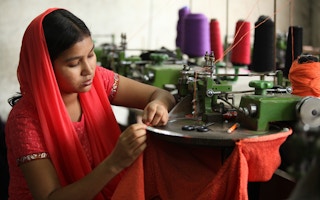Over the last year, the manufacturing industry introduced bolder ways to make supply chains more transparent and sustainable. The circular economy gained momentum in tackling waste and blockchain was applied to the murkiness of supply chain tracing. Here are the top 5 manufacturing stories of 2017.
1) Can blockchain clean up the fashion industry?
A UK-based startup wanted to make the fashion industry more sustainable using blockchain, best known as the technology behind digital currency Bitcoin. The world’s first blockchain tracked garment was unveiled last year at the Copenhagen Fashion Summit, through a partnership with Provenance, A Transparent Company and London College of Fashion’s Innovative Agency. The initiative’s founder, Martine Jarlgaard, launched a pilot initiative that enabled the garment to be tracked from the raw material through the supply chain to the final product using a QR code and a near field communication (NFC) token. The aim was for consumers to be able to make informed buying decisions using the app.
2) Circular economy gained momentum
The circular economy concept gained momentum in the business community in 2017. A key development came in October when scientists in Hong Kong invented a new technology that enabled polyester to be harvested from unwanted textiles and recycled into new clothes, and in May when Unilever moved to close the loop on polluting plastic sachets. Unilever also unveiled new commitments to ensure that 100 per cent of the plastic packaging in its products is reusable, recyclable or compostable by 2025, to reduce the amount of discarded plastic.
In the Netherlands, a new initiative dubbed Fashion for Good launched in April with the hope of rethinking the way the fashion industry uses materials so that they can be constantly reused without any waste.
3) Freeing supply chains from slavery
Companies faced increased pressure to tackle modern day slavery and human rights issues in their supply chains in 2017. Activists were vocal about getting businesses and consumers to address worker exploitation in global supply chains. The Ethical Fashion Initiative called on companies to put people above profit at the heart of business models and the Stop Child Labour Coalition launched a campaign for brands to share profits to keep children in school.
The textile industry in India came under the spotlight when a factory blast in Bangladesh highlighted the neglect of workplace safety and when underpaid workers pursued $7.6 million in compensation.
A few companies stepped up in 2017 by introducing better policies and grievance systems. Adidas introduced an app that allows workers in their China factories to anonymously report on issues while H&M set goals with suppliers to introduce proper pay structures for garment factory workers by 2018.
4) Cutting out deforestation
Deforestation came back into the spotlight in 2017 with more companies being called out for using illegally logged wood. Retailers in the US were forced to halt sales of hardwood flooring linked to illegal logging in Papau New Guinea and a major Dutch timber company was found guilty of dealing in illegal teak this year. A recent motion passed at the Forest Stewardship Council (FSC) General Assembly became a contentious affair as it could mean that recent deforesters could become certified. The current rule does not allow companies that cut down forests since the FSC’s inception in 1994 to make way for timber plantations to apply for its certification.
5) Commodities under scrutiny
The agricultural commodities sector received greater scrutiny with an increase in the number of shareholder proposals requesting information on where companies have been sourcing commodities. This prompted US-based NGO Ceres to release a new investor guide - Engage the Chain - to inform investors about the environmental and social impacts of eight different agricultural commodities including beef, dairy, palm oil, soy and sugarcane.
Meanwhile, international fashion brands such as Primark sought more ethical and sustainable ways to source key raw material cotton.
This story is part of our Year in Review series, which looks at the top stories that shaped the business and sustainability scene over the last 12 months.





















